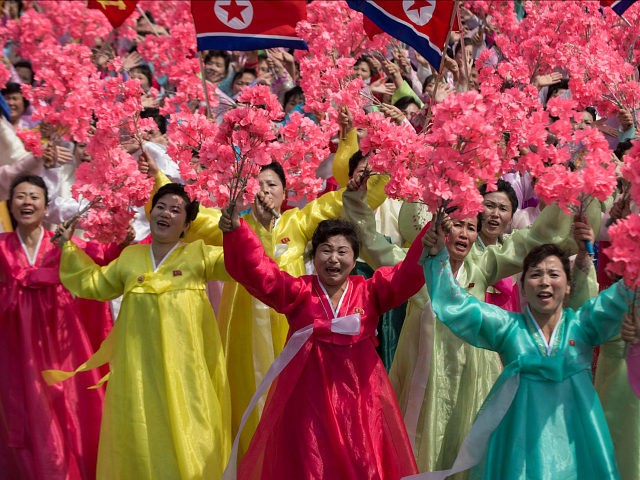“Turns Out North Korea’s Economy Is Actually Doing Pretty Well,” the headline at Vox proclaims. The bulk of the article offers nothing to support this assertion.
The piece is based heavily on a “fascinating article” in the New York Times, which purportedly demonstrated how North Korea “has been experiencing economic success in recent years by taking steps toward allowing private enterprise to spread throughout the country.”
“According to the Times, some experts estimate that the North Korean economy could be growing between 1 and 5 percent per year. If North Korea’s economy is actually growing at the higher end of that estimate – say, around 4 percent – the country would be showing surprising resilience in the face of international sanctions,” Vox chirped.
And then, four paragraphs in, Vox splashed a little cold water in its face and remembered which country it is talking about, admitting that North Korean quality of life is “nightmarish” and marked by “rampant food shortages,” leaving 70 percent of the population dependent on food aid and 40 percent of the people malnourished.
Nevertheless, Vox persisted, gamely forging ahead with an argument that black markets and tiny government-approved quasi-free marketplaces were prodding North Korea toward a Poland-style uprising against centralized control.
Late in the article, Vox mentions that 80 percent of North Korea’s consumer goods come from China but leaves out the more pertinent fact that North Korea gets almost all of its oil from China. China and a few other friendly states indulge the illicit trade that provides Pyongyang with much of the equipment and hard currency needed for its weapons programs. That is how North Korea “survives sanctions.”
The country’s economic system is basically a laboratory experiment in feral communist brainwashing financed by Beijing. China keeps this nightmare going because it loathes the notion of a reunified Korea allied with the United States and because it likes having a vicious attack dog snarling at the Western world and its Pacific Rim friends.
China profits a great deal by promoting itself as the only hand that can tame the Kim regime. The cost of keeping North Korea’s “economy” afloat has been reasonable until now. That cost/benefit analysis is changing as Pyongyang closes in on nuclear ICBM technology, which is why Beijing seems to be dealing more sternly with the Kim regime than ever before.
There is nothing more to the North Korean economic picture than this, which Vox slowly figures out by the end of its silly article, since not the faintest trace of the headline assertion that “North Korea’s economy is actually doing pretty well” remains by the final paragraph. It is actually a story about how starving and terrified North Korean citizens are trying to use a little market cooperation to survive the hideous communist economy they are trapped in. Black markets are the defiance of an economic system, not a component of it.
Part of the problem here is an absurdity of scale. Four percent “growth” for a dirt-poor starvation economy is nothing. That is like saying a man with ten cents in his pocket who discovers a dime on the street has doubled his financial holdings.
The low end of the growth estimate that served as the entire premise for the Vox article was one percent, which sounds more like the “totally stagnant economic backwater” Vox claims North Korea is not. Even that paltry estimate is based on the highly dubious assumption that any meaningful economic data can be extracted from the North Korean dungeon state. Communist tyrannies have a long history of manufacturing fraudulent data to make themselves look prosperous.
“North Korea is doing pretty well” stories erupt almost every year, based on similarly flawed economic analyses that speculate the dungeon state’s economy might be growing a little. There was a previous boomlet of such media coverage in the summer of 2015, prompting The Diplomat to conduct a bit of debunking.
After duly noting that all economic data from North Korea is suspect and pointing out that North Korean growth stories always ignore the many negative economic events plaguing the secretive nation, The Diplomat quoted blogger Joshua Stanton explaining that North Korea really has two economies and the larger one keeps the bulk of the population in a constant state of misery:
North Korea’s economy is bifurcated between the have-nots in the provinces and the haves — the regime, the elites, and the donju (middle class), who are are mostly well-connected figures who trade with and on behalf of the regime, and largely supply the elite with goods that aren’t available to most North Koreans. Although there is more overlap between these economies today than there was five years ago, these remain two distinct economies for the most part.
No, North Korea’s economy is not “doing well,” and there is little solid evidence that it’s doing better than it was last year. It endures the pressure of sanctions because China constantly relieves that pressure and because murderous totalitarian regimes can absorb a great deal of economic pain with their captive populations. Even a dirt-poor and dependent tyranny can afford to maintain a small ruling clique in high style. Only China can exert the type of pressure that would really hurt North Korea’s rulers.

COMMENTS
Please let us know if you're having issues with commenting.